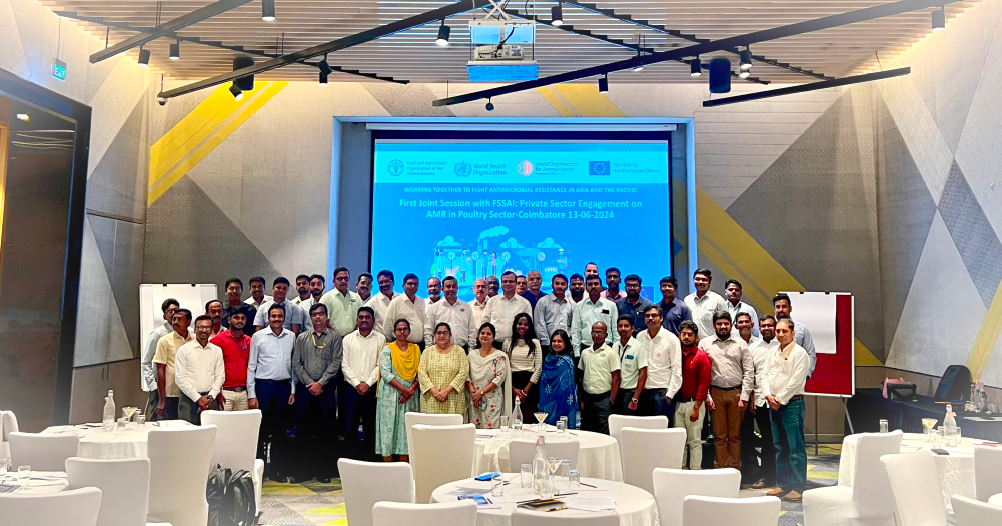FAO and FSSAI organize the first private-sector engagement to combat AMR in the poultry sector in India

The Food and Agriculture Organization of the United Nations (FAO) India and the Regional Office for Asia and the Pacific (FAORAP), in collaboration with the Food Safety and Standards Authority of India (FSSAI) and the National Food Laboratory (NFL) in Chennai, conducted the first of three joint sessions titled "Working together to fight antimicrobial resistance in Asia and the Pacific" in Coimbatore on June 13, 2024. The session was organized under the European Union (EU) Tripartite Antimicrobial Resistance (AMR) project, to increase private sector engagement in combating AMR. Over 50 participants, including poultry producers, integrators, processors, feed manufacturers, chick suppliers, fast food retailers, poultry farmers, and poultry antibiotics and medicine manufacturers attended the workshop.
Dr Arul Anand, Joint Director of FSSAI Chennai, emphasized the vital role of poultry farming in our food system and the urgent need to address antimicrobial resistance to ensure food safety. He stated, “Antimicrobial resistance is a growing threat, and it is imperative that we adopt sustainable practices and innovative solutions to mitigate this risk.”
Mr Milo Bystricky, Regional AMR Private Sector Food Safety specialist, FAORAP, highlighted the current and potential role of private sector to address AMR in the poultry sector. He said, “By implementing responsible practices and investing in innovative solutions, we can collectively ensure food safety and protect public health. The experience, knowledge, and best practices from the private sector can be adopted, making our collaboration essential in driving meaningful change and mitigating the risks associated with AMR.”
The inaugural session focused on the poultry sector and started with an overview of AMR. The discussion emphasized the economic impact of AMR and the regulatory measures for its control in India. The workshop also delved into the current and future roles of the private sector in combating AMR. Additionally, it highlighted the benefits and challenges of public-private partnerships and explored potential pathways for collaboration to address AMR effectively.
Notable participants from the private sector included Dr Shirish Nigam, President, Indian Federation of Animal Health Companies (INFAH), representatives of Venkys, Suguna Foods, Lifeline feeds, Allana, Vista Processed Foods and Swamys Chicken. The public sector was represented by Dr Arul Anand, Joint Director, FSSAI Chennai, Mr Pankaj Kumar Meena, Assistant Director, FSSAI Delhi, Dr Gowthaman V, Assistant Professor, Tamil Nadu Veterinary and Animal Sciences University (TANUVAS) along with officers from the State Food Safety Department.
The subsequent joint sessions on aquaculture and fisheries are planned to be organized in 2024 for in Vishakapatnam and Kochi, respectively. These sector-specific joint sessions are designed to tailor strategies and solutions to the unique challenges faced by each industry, ensuring a comprehensive and effective approach to combating AMR.
This joint initiative aims to deepen the understanding of AMR among private sector representatives, highlight its impact on their operations, and explore how they can be a part of the solution. The initiative also seeks to foster partnerships between the private and public sectors, providing sustainable solutions from the private sector’s perspective. The collaborative efforts from these sessions have set the stage for ongoing partnerships and continuous stakeholder engagement to address AMR effectively.
FAO remains committed to achieving food security for all by ensuring regular access to safe food, including addressing issues related to AMR. These joint sessions mark a significant step in global efforts to combat antimicrobial resistance in the animal and fisheries sector.
Photo credit: FAO/Oo Khin

